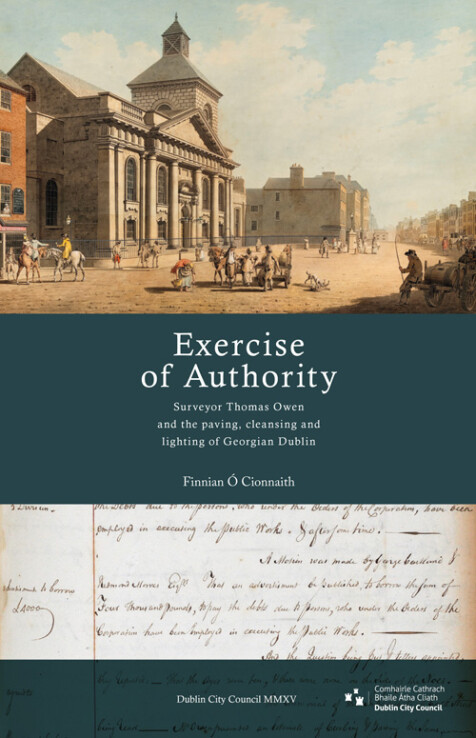Exercise of authority
Surveyor Thomas Owen and the paving, cleansing and lighting of Georgian Dublin
Finnian Ó Cionnaith
‘This book is a very welcome addition to the social and planning history of Dublin … One of the most appealing aspects of this book is that it hides its erudition with style. Although it has been researched and written to the highest academic standards, it bears its learning lightly. To a large degree, it reads like a thriller; indeed, a thriller, which once started, is very hard to put down … the book has been beautifully produced. The quality of binding, cover, paper and typeface are of a very high standard and the reproduced prints, plans and maps throughout the volume are extremely valuable … this book can be highly recommended for its scholarship, its spritely readability and its wonderful insights into the murky world of Georgian Dublin. The extensive use of quotations from the original minutes of the Dublin Paving Board and other contemporary documentation gave it an immediate, and sometimes hilarious, authenticity’, Muiris de Buitléir, Irish Econoomic and Social History (2016)
‘[This book] is full of interesting facts on the Dublin Paving Board … Exercise of Authority usefully examines largely unexplored aspects of the development of Georgian Dublin, complementing well-known accounts of the city’s architecture by authors like Maurice Craig and Edward McParland’, Frederick O'Dwyer, Irish Arts Review (Summer 2016).
‘Ó Cionnaith brings the reader right into the turbulent world of 18th-century Dublin from street level, focusing on the small group of men who tried to bring order to the city, charting the political and financial upheaval that followed in their wake … This richly-illustrated book is essential for a complete understanding of Georgian Dublin’, Michael Merrigan, Ireland's Genealogical Gazette (March 2016).
‘Finnian Ó Cionnaith’s book looks in depth at one of the agencies set up to resolve the problems of the city, the Paving Board … The key official of the board was the surveyor, Thomas Owen, and he receives equal billing with the board itself in this study … A somewhat chaotic character himself – like the streets on which he worked – Owen did manage to improve the city’s thoroughfares not only in the matter of paving but in cleansing and lighting also … The Paving Board was the first body to attempt to dignify our streets by bringing order, cleanliness and, may I say it, civilisation in the original meaning of that word … This hitherto overlooked aspect of the city’s history is expertly told by Ó Cionnaith … [here] we have an author with a professional knowledge of his topic. This slim-ish volume lives up to the high standards of meticulous research and concise writing already set by the author in his previous work on the eighteenth century Dublin map-making and surveying industry, Mapping, measurement and metropolis’, Séamas Ó Maitiú, Dublin Historical Record (Spring/Summer 2016).

